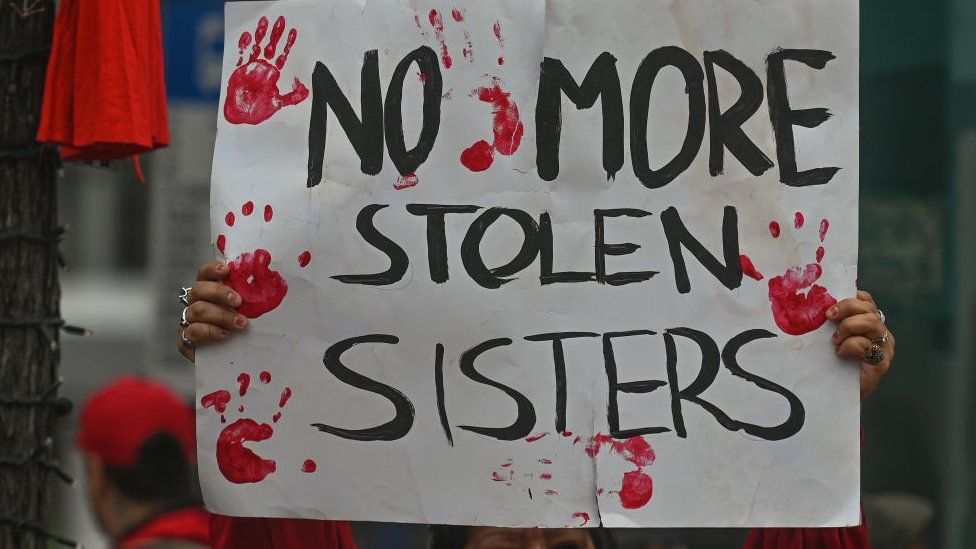ARTICLE AD BOX
 Image source, NurPhoto via Getty Images
Image source, NurPhoto via Getty Images
The Winnipeg case has brought renewed focus to the issue of missing and murdered indigenous women and girls in Canada.
Police in the Canadian city of Winnipeg are under increasing pressure to search for the bodies of murdered indigenous women in a city landfill.
Bodies of three out of four women killed earlier this year by an alleged serial killer have not yet been recovered.
Winnipeg police said they believe the remains of two of the women are in a landfill called Prairie Green.
They say logistical challenges have made the search extremely difficult.
Warning: Readers may find the details in this story distressing
The decision not to search the landfill has been met by protests from indigenous advocates and the families of the women, who have since travelled to Ottawa to call for renewed attention to the issue of missing and murdered indigenous women and girls in Canada.
They have also called on the Winnipeg police chief to resign, and have asked Canada's government to help fund the search for the bodies of the three murdered women in Winnipeg.
"How many other women are they not looking for?" said Cambria Harris at a protest in Winnipeg on Sunday.
Police believe the remains of Cambria's mother, Morgan Beatrice Harris, 39, are at the Prairie Green landfill, alongside the remains of Marcedes Myran, 26.
Both women were killed in May, police said, and are members of the Long Plain First Nation.
Police, however, said they will not search the landfill to recover their bodies because too much time has passed and because the scale of the area is too big.
"We have no starting point," said Winnipeg police chief Danny Smyth on 2 December. "It wouldn't be feasible at this point."
Mr Smyth later said in a statement that he will not resign from his position as police chief amid calls for him to do so, and that he is committed to delivering justice for the families of the murdered women.
The Prairie Green landfill has paused its operations as of Thursday as calls for a search of the two women intensify.
The remains of another woman, 24-year-old Rebecca Contois from O-Chi-Chak-Ko-Sipi First Nation in the province of Manitoba, were found in a separate Winnipeg landfill called Brady Road in May.
Police said the search for Ms Contois was possible because they could narrow down an area where her remains were believed to be, and because she was found closer to her time of death.
The families of Ms Harris and Ms Myran have publicly decried police's decision not to search for the women's remains.
"I feel very wronged, and I am so heartbroken," said Ms Harris' daughter, Cambria, at a press conference in Ottawa on 6 December.
"I should not have to stand here and beg so that you will find and bring our loved ones home," she said.
Indigenous leaders have joined the families' calls for a proper search, including the chief of Long Plain First Nation, where Ms Harris and Ms Myran were from.
"The message you are sending to the greater community, to the non-Indigenous community is that Indigenous women don't matter," said chief Kyra Wilson.
A fourth victim, also believed to be an indigenous woman, has yet to be identified and the whereabouts of her body remain unknown. The local indigenous community has given her the name Buffalo Woman (Mashkode Bizhiki'ikwe).
Police believe all four women were killed by Jeremy Skibicki of Winnipeg, who was charged with four counts of first-degree murder. The 35-year-old is now in police custody. His lawyer has told Canadian media that he intends to plead not guilty.
The murders have brought renewed attention to Canada's history of disproportionate violence faced by indigenous women, which was called a "genocide" by a national public inquiry in 2019.
A report by the Royal Canadian Mounted Police (RCMP) in 2016 estimated that around 1,200 First Nations women had been killed or gone missing between 1980 and 2012.
But the National Inquiry into Murdered Indigenous Women and Girls concluded that there is "no reliable estimate", and added that the RCMP's figure is narrow in scope.

 2 years ago
45
2 years ago
45








 English (US) ·
English (US) ·